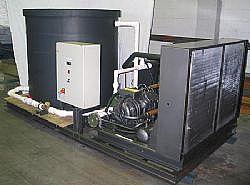THE MAIN reason for selecting a chiller is to cool and protect your valuable process equipment such as spot welders, injection moulding equipment, food processing equipment and other machinery used in various industrial and manufacturing applications. A chiller may commonly represent a small fraction of cost of the processing equipment but it certainly provides a solid protection for your investment, providing many years of service. So, what is a chiller? Essentially, it is a closed loop system utilizing a refrigeration system to chill a secondary fluid (usually glycol or water) which is then used to provide the necessary cooling to the process. Typically chillers are used for applications requiring coolant temperatures less than ten degrees Celsius.
Typical applications include:
Plastics Industry reduce cycle times in injection moulding and blow moulding by regulating die temperatures. For plastic extrusion, a water chiller can be used to regulate product consistency by maintaining a constant temperature in key machinery.
Baking Industry used in the mixing process, chilled water from a water chiller or water tempering unit allows longer mixing times, improving final product quality for any given grade of flour.
Wine Industry glycol chillers are commonly used in the wine and brewing industries to cool the grape mixture immediately after picking, allowing wineries to manage the fermentation process. Glycol chillers can also be used to dissipate excess heat during fermentation.
Pharmaceutical Industry water chillers are used to dissipate heat from emollient vats prior to packaging, saving companies money by rapidly reducing total manufacturing time and decreasing labour costs.
Food Industry cold water from a water chiller can be used for cooling any process. Examples include chocolate manufacturing, confectionery manufacturing, fruit and vegetable processing, and cheese submersion.
Printing Industry water chillers can be used to regulate temperatures in presses and rollers, reducing stretching and bleeding, reducing print time and increasing quality.
Other industries where water chillers or process chillers from Realcold can be used are in steel machining to dissipate heat from machining processes; air conditioning to supply chilled water to air handlers; mining to assist in regulating temperatures in mines; for air compressors to chill water cooled models; for hospitals to provide chilled water for air conditioning or any water cooled machines; lasers to cool machinery; and petroleum processing to cool any process.
Increased production
The speed and accuracy of production will increase as you maintain a constant and proper cooling temperature in your equipment. A chiller will reduce the number of rejected parts while increasing the number of parts produced per hour.
You may ask yourself: Does my equipment break down during summer months? Are there periods when our rejection rates are high?
A water tower may provide adequate cooling during fall and winter months, but fail during the hotter periods of the year. A water chiller however, will provide stable coolant temperatures all year round.
Save water and related costs
Do you waste city water? Around the country there is a growing recognition of the tremendous cost associated with wasting city water for process equipment. Should you do a cost analysis, you will be pleasantly surprised to realize how quickly a chiller ends up paying for itself and saves you money for years to come.
Sizing a chiller correctly
The importance of selecting a correctly sized chiller cannot be downplayed. An undersized chiller will always be a problem never able to properly cool the process equipment. On the other hand, an oversized chiller will result in unnecessary capital expense and may never be able to run at its most efficient level.
Selection of the correct sized chiller ensures years of continuous and efficient service. If you would like help with water chillers, contact Realcold widely regarded as the industry leaders in this field in New Zealand.






